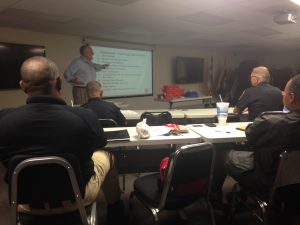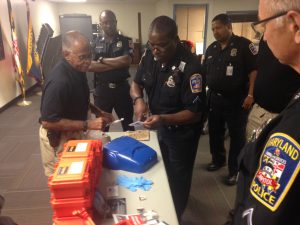Archives
Department of General Services Maryland Capitol Police Develops Overdose Response Program
The Department of General Services Maryland Capitol Police (MCP) has joined the fight to combat the alarming rise in opioid-related drug overdoses, including those associated with heroin. In conjunction with the Department of Health and Mental Hygiene (DHMH), the Maryland Capitol Police has developed an overdose response program that enables law enforcement personnel, as first responders, to take lifesaving actions when encountering individuals suffering from apparent drug overdoses.
With DHMH’s approval, members of the Capitol Police Training Unit were certified to train other MCP personnel in the administration of Naloxone, a prescription medication that blocks or reverses the effects of opioid overdose. The drug can reverse the effects in a matter of seconds and stabilize the victim until they can receive additional medical attention.
“A matter of seconds can mean the difference between life and death in an opioid overdose,” said MCP Chief Mike Wilson. “We are committed to reducing the number of opioid-related deaths in the state, and now we have the training and tools to make this possible.”
The number of drug and alcohol-related deaths in Maryland increased in 2015 for the fifth year in a row, reaching an all-time high of 1259 deaths and representing a 21% increase over the number of deaths (1041) in 2014.
Dr. Albert J. Romanosky MD PhD, Medical Director / State Emergency Preparedness Coordinator, Office of Preparedness and Response at DHMH, conducted “train the trainer” classes for MCP training staff and subsequently certified them to teach MCP law enforcement personnel in the administration of Naloxone. Dr. Romanosky also worked closely with MCP to develop and certify their overdose response policies and program. All MCP officers will receive the training and will be certified for two years. Naloxone will be made available in emergency kits that they carry to the scene of a reported overdose.
Nearly 33 thousand people – primarily law enforcement personnel – have been trained to administer Naloxone through DHMH’s Overdose Response Program.
“This is a quality of life issue that impacts not only opioid victims but also their families and communities,” said General Services Secretary Ellington Churchill, Jr. “Governor Hogan and Lt. Governor Rutherford are spearheading the state’s efforts to combat substance use disorder, and the training MCP is getting makes it possible for us to have a direct impact.”
# # #
For information on policies to fight addiction and overdose in Maryland, or to find substance-use-disorder treatment resources, visit http://goo.gl/KvEzQw.



 1-888-373-7888
1-888-373-7888 233733
233733